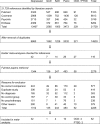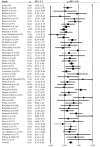Adding psychotherapy to antidepressant medication in depression and anxiety disorders: a meta-analysis
- PMID: 24497254
- PMCID: PMC3918025
- DOI: 10.1002/wps.20089
Adding psychotherapy to antidepressant medication in depression and anxiety disorders: a meta-analysis
Abstract
We conducted a meta-analysis of randomized trials in which the effects of treatment with antidepressant medication were compared to the effects of combined pharmacotherapy and psychotherapy in adults with a diagnosed depressive or anxiety disorder. A total of 52 studies (with 3,623 patients) met inclusion criteria, 32 on depressive disorders and 21 on anxiety disorders (one on both depressive and anxiety disorders). The overall difference between pharmacotherapy and combined treatment was Hedges' g = 0.43 (95% CI: 0.31-0.56), indicating a moderately large effect and clinically meaningful difference in favor of combined treatment, which corresponds to a number needed to treat (NNT) of 4.20. There was sufficient evidence that combined treatment is superior for major depression, panic disorder, and obsessive-compulsive disorder (OCD). The effects of combined treatment compared with placebo only were about twice as large as those of pharmacotherapy compared with placebo only, underscoring the clinical advantage of combined treatment. The results also suggest that the effects of pharmacotherapy and those of psychotherapy are largely independent from each other, with both contributing about equally to the effects of combined treatment. We conclude that combined treatment appears to be more effective than treatment with antidepressant medication alone in major depression, panic disorder, and OCD. These effects remain strong and significant up to two years after treatment. Monotherapy with psychotropic medication may not constitute optimal care for common mental disorders.
Keywords: Combined treatment; antidepressant medication; anxiety disorders; depressive disorders; dysthymia; meta-analysis; obsessive-compulsive disorder; psychotherapy.
Copyright © 2014 World Psychiatric Association.
Figures


References
-
- Kessler RC, Berglund P, Demler O, et al. National Comorbidity Survey Replication. The epidemiology of major depressive disorder: results from the National Comorbidity Survey Replication (NCS-R) JAMA. 2003;289:3095–105. - PubMed
-
- Kessler RC, Berglund P, Demler O, et al. Lifetime prevalence and age-of-onset distributions of DSM-IV disorders in the National Comorbidity Survey Replication. Arch Gen Psychiatry. 2005;62:593–602. - PubMed
-
- Ustun TB, Ayuso-Mateos JL, Chatterji S, et al. Global burden of depressive disorders in the year 2000. Br J Psychiatry. 2004;184:386–92. - PubMed
-
- Saarni SI, Suvisaari J, Sintonen H, et al. Impact of psychiatric disorders on health-related quality of life: general population survey. Br J Psychiatry. 2007;190:326–32. - PubMed
-
- Berto P, D'Ilario D, Ruffo P, et al. Depression: cost-of-illness studies in the international literature: a review. J Ment Health Policy Econ. 2000;3:3–10. - PubMed
Grants and funding
LinkOut - more resources
Full Text Sources
Other Literature Sources
Medical
Miscellaneous

